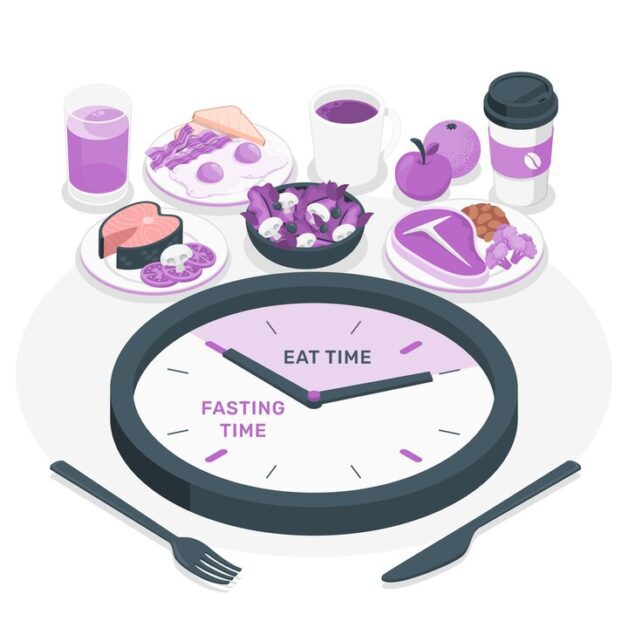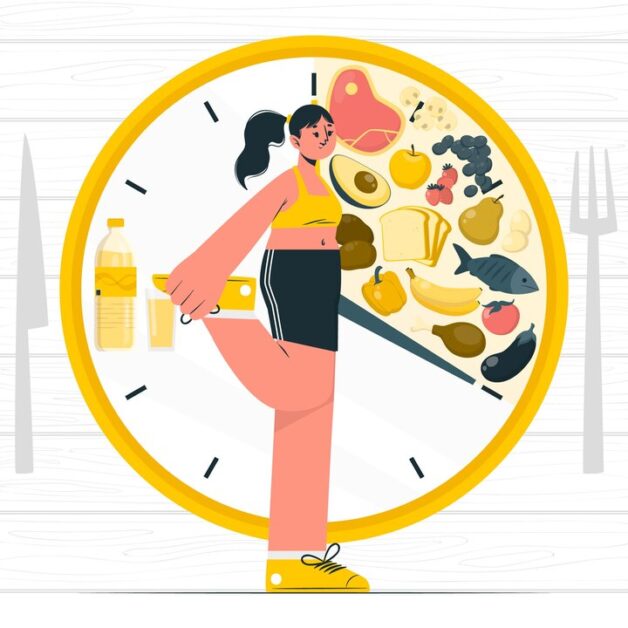This content is for informational and educational purposes only. Always consult a qualified healthcare provider.
Last Updated on June 8, 2024 by Grace Oluchi
Various cultures and religions have practiced fasting for centuries. Fasting can have potential health benefits, such as promoting weight loss, improving metabolic health, enhancing mental clarity, and reducing inflammation.
In this article, you’ll learn if it’s possible to lose weight with fasting, its health benefits, and other interesting factors.
📋 Table of Contents
What Is Fasting in Simple Words?


Fasting is the act of intentionally abstaining from food and drinks for a set period, there are many different ways of fasting. Some of these are, intermittent, water, juice, partial and dry fasting, and so on. Anyone can choose how to fast, as fasting can be subjective.
Most times people fast for certain reasons including, religious, spiritual, health, or weight loss purposes. However, you may even fast for no reason, maybe you’re just not hungry or just choose not to eat anything. Some people may not even feel hungry due to the food they ate the night before, and are still feeling full, so they just wait it out. Not everyone fast for a “reason”. And that’s okay.
Can You Lose Weight With Fasting?


This depends on how you fast are and other factors. According to the general rule, to lose weight you have to burn more than you consume. Now the “burn” doesn’t have to be exercise, as you can still burn calories without going to the gym. It’ll all depend on how much you eat every day, and your lifestyle in general. For example, the most approached fasting method people go for is intermittent fasting. However, there are other ways to fast and still burn some calories.
Some people frown at fasting because they see it to be restrictive and unsustainable, while others find it more effective and convenient. Theoretically, abstaining from all or certain foods and beverages should decrease your overall calorie intake, which could lead to increased weight loss over time.
An older review in 2015 showed that fasting for the whole day could reduce your body weight by up to 9% and significantly bring down body fat in 12-24 weeks. In other words, fasting can be an efficient technique to reduce body weight, but it doesn’t have to be the sole thing you have to do.
5 Ways Fasting Can Aid In Weight Loss
1 . Increased fat burning
During fasting, the body’s insulin levels decrease and tells the body to use stored fat for energy instead of glucose from food. This shift to fat burning can promote weight loss, particularly from adipose tissue (body fat).
2 . Caloric restriction
When you fast, you consume fewer calories, leading to a calorie deficit over time. This calorie deficit can result in weight loss, as the body begins to use stored fat for energy.
3 . Reduced appetite
Some forms of fasting, such as intermittent fasting, may help reduce how many times you feel hungry and lower calorie intake by regulating hunger hormones such as ghrelin. And when you don’t feel hungry all the time, your cravings reduce, and you fast, it can make it easier for you to keep up with a calorie-controlled diet and achieve weight loss goals.
4 . Burn more fat during exercise
During a period of fasting, particularly before your workout session or any form of physical activity, you may help your body increase the use of stored fat for energy This can enhance fat burning and improve your exercise performance, which can help you burn calories and aid your weight loss journey.
5 . Improved insulin sensitivity
Fasting can improve insulin sensitivity, and allow your cells to respond better to insulin and glucose uptake. This can help prevent insulin resistance and prevent gaining a lot of weight and other health conditions such as type 2 diabetes. During this process, it may also promote weight loss by helping your body use glucose for energy.
When a person fasts, it can be an effective tool for weight loss, but it may not be suitable for everyone, and everyone’s results may vary.
Some Cons Of Fasting For Weight Loss Explained
The reason some people don’t like to fast, especially for weight loss is because of some issues it may come with. Such as:
Decreased energy levels
Fasting can lead to decreased energy levels, fatigue, and difficulty concentrating, especially during the initial adjustment period. This can affect your daily activities, work performance, and exercise tolerance.
Muscle loss
During prolonged fasting or extreme calorie restriction, your body may break down muscle tissue for energy, leading to muscle loss and a decrease in lean body mass. This can negatively impact metabolism and body composition.
Eating disorders
When someone creates a fasting regimen, it may trigger or worsen disordered eating patterns, such as overeating, compulsive eating, or restrictive eating behaviors.
Could be a potential for negative health effects
While it’s true that when you fast, you can get some health benefit, it may not be the case for everyone, as it may not be suitable for some people, especially those with certain medical conditions, such as diabetes, eating disorders, or hormonal imbalances. Fasting without proper medical supervision can increase the risk of adverse health effects and complications.
Nutritional deficiencies
If you fast for a long time or practice an overly restrictive diet, it may lead to an inadequate intake of essential nutrients, vitamins, and minerals. This can potentially increase the risk of nutrient deficiencies over time. Because you wouldn’t have enough space to eat other forms of food. You might end up not eating some important foods for a long time or may eat one type of food during this period. There has to be a balance when it comes to your diet.
Stress and anxiety
Fasting may increase stress levels and anxiety, particularly in people who are sensitive to hunger cues or have a history of disordered eating.
Potential for nutrient absorption issues
It may affect your body’s ability to absorb nutrients and digest food when it is reintroduced after you finish your fast. This can lead to gastrointestinal discomfort, bloating, and other digestive issues, especially if you large or heavy meals too quickly.
Other issues that can come up are
Social and lifestyle changes
Your lifestyle of fasts may disrupt your social interactions, such as
- meal times at home
- your daily routines
- maintain social relationships
- participating in social gatherings that involve food.
Now that you are fasting, you may not be able to have dates with your friends or even partner, unless it is within your fasting schedule. Birthdays may be boring because you wouldn’t be able to eat some cake or have a taste that cocktail your friend Mike has been boasting about.
And if you do indulge, you’ll start to feel guilty for not being able to keep up. You’ll start to think, you lack discipline and may start saying these words in your head:
“I can’t even keep up my fasts”
“ I may never be able to lose weight”
“ Why can’t I fast?”
“Why is it so hard to fast”
“Now that I fast, should my life be over”
“Maybe I should stop this fast”
“Maybe it’s the universe telling me it’s not worth it”
“Why can’t I get anything right”
Some word of advice
To avoid these issues, you must find a fasting regimen that fits into your lifestyle and supports your overall well-being. And never fast to punish or control your body. Any action you’ve been taking with food is on you and not your body. Your mindset is very crucial, and that’s why It’s important to approach fasting with a healthy mindset.
You can fast and it can be fun, it doesn’t have to seem like a pain or an experience you have to endure. Just see it as an adventure and trying something new, and also a chance to change some things. Be patient with yourself and understand that it is okay to eat something during your fast.
Events such as weddings, gender reveal, or birthdays, don’t have to stop. It’s okay to still enjoy these moments since they’re a part of your life. Everything doesn’t have to stop, and the world doesn’t have to seem like it’s about to end. If you make fasting a big deal, it’ll be a big deal. When it comes to one’s health, and adopting some changes it’s important to talk with a healthcare professional. As they would be able to help determine if it’s okay and appropriate for you to fast. And they’ll also ensure that you do it in a way that supports your overall health and well-being. Especially if you have any underlying health conditions or specific dietary requirements.
The best Way To Introduce Yourself To Fasting.
We all know that not everyone visits the doctor, before trying anything new, so here are a few tips you can follow concerning fasting.
Educate yourself
Before you start to fast for weight loss, take the time to research different fasting methods, their potential benefits, and safety considerations. Understanding the principles behind fasting and its potential impact on your body can help you make better decisions.
Start slowly
If you’re new to fasting, don’t rush into it, consider starting with shorter fasting periods or less restrictive fasting methods, such as intermittent fasting.
Begin with a fasting window that feels comfortable for you, such as fasting for 12 hours overnight, and gradually increase the duration as you become more accustomed to it.
Go for the one you know you can do
Choose the right method, by picking a type of fast that aligns with your lifestyle, preferences, and health goals.
There are various ways you can fast, including intermittent fasting, time-restricted feeding, alternate-day fasting, and modified fasting. Experiment with different methods to find what works best for you, and you’ll be okay.
Stay hydrated
Always remember to drink plenty of water when you fast, to stay hydrated and help curb hunger. Herbal teas, black coffee, and other non-caloric beverages can also be consumed during these periods should help suppress appetite and provide hydration. You don’t want to be thirsty while you’re on a fast.
Check out this article on the benefits of drinking water and how to drink it.
Listen to your body
Pay attention to how fasting affects your energy levels, hunger cues, mood, and overall well-being. If you feel significant discomfort, fatigue, or other adverse effects, consider adjusting your style or, in other cases, visit your doctor.
Be patient and flexible
As mentioned above, it’s okay to give space for other events in your life, as you fast. Try to give yourself time to adapt and be patient with the process.
It’s normal to experience some challenges or setbacks along the way, so be flexible and adjust your schedule as needed to suit your needs and lifestyle.
Focus on nutrient-dense foods
When breaking your fast, prioritize nutrient-dense foods that provide essential nutrients, vitamins, and minerals to support your overall health and well-being. Add plenty of fruits, vegetables, whole grains, lean proteins, and healthy fats in your meals to nourish your body and promote satiety. Please don’t break your fast with sugary drinks, or sugary snacks and the likes of them. What you eat after your fast, matters and plays a long role in your weight loss journey.
Keep account
Also remember to monitor your progress and keep track of your fasting schedule, eating patterns, and how you feel during fasting and feeding periods. Monitoring your progress can help you identify patterns, track changes in energy levels or weight, and make adjustments where you deem fit.
When you make intentional decisions, you’ll feel less pressure and enjoy your fasting process more. However, remember that it’s still very very very important to visit a healthcare provider regarding such things.
Some Well-Known Fasting Methods (You Can Try)
There are several types of ways you can fast, each with its approach and potential benefits. Some common types include:
Intermittent fasting (IF)
This involves cycling between periods of eating and fasting. The most popular methods of intermittent fasting include the
16/8 method (fasting for 16 hours and eating within an 8-hour window)
the 5:2 method (eating normally for five days and restricting calorie intake on two non-consecutive days)
alternate-day fasting (alternating between regular eating days and fasting days).
Water fasting
A water fast involves consuming only water for a specified period, no food no nothing, typically ranging from 24 hours to several days. It is considered one of the most extreme forms of fasting and should be done under medical supervision.
Time-restricted feeding
This is similar to intermittent fasting but focuses more on the timing of meals rather than calorie restriction. It involves consuming all meals within a specific time window each day, such as eating only between 10:00 a.m. and 6:00 p.m.
Juice fasting
You’ll only consume fruit or vegetable juices for a set period while abstaining from solid food. Some people choose to complement this type of fast with herbal teas or broth.
Partial fasting
It involves restricting certain foods or food groups for a period, such as fasting from animal products, processed foods, or sugar. This type of fast is very helpful, as it can help those with certain food addictions.
Fasting-mimicking diet (FMD)
FMD is a program that aims to mimic the effects of fasting while still allowing you eat some food. It involves consuming a low-calorie, low-protein, and low-carbohydrate diet for 4–7 days. This type of fast can be a bit easier on beginners.
Modified fasting
In this type of fast, you’ll be allowed to take some calories during your fast, mostly in the form of low-calorie meals or snacks. This approach may be more sustainable for some newbies compared to strict water fasting.
How Fasting Can Improve Your Health For The Better
Lower stress and inflammation: Fasting has been shown to lower inflammation by reducing oxidative stress and has also been demonstrated to lower insulin resistance. A 2023 study of 209 people found how intermittent fasting for 3 days a week, lowered the risk of type 2 diabetes by increasing insulin sensitivity.
Brain health: Being in a fast state can improve cognitive function, improve mood, and reduce the risk of neurodegenerative diseases such as Alzheimer’s and Parkinson’s disease.
Build and maintain a healthy gut: Removing food for a period gives the gut a break from digesting and assimilating nutrients and can benefit the microbiome.
Weight loss and fat loss: Being away from food for a while can promote weight loss by creating a calorie deficit and increasing fat burning. It may also lead to improvements in body composition by reducing body fat percentage while preserving lean muscle mass.
At the end of the day, fasting is a beneficial method for weight loss and even maintaining your weight, and improving your overall health. Just remember to not rush into it and see how things go.

